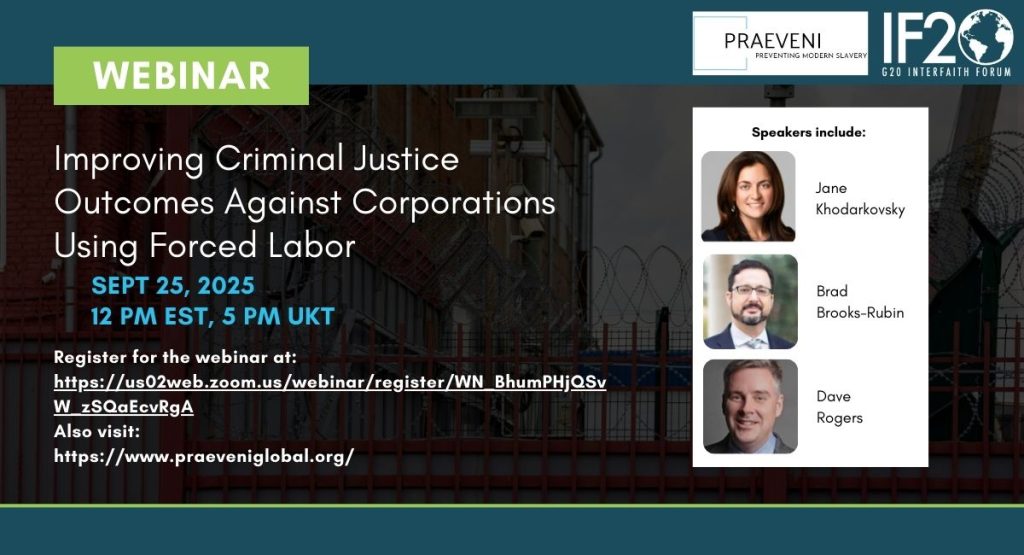By JoAnne Wadsworth, Communications Consultant, G20 Interfaith Forum.
– – –
On September 25th, 2025, the G20 Interfaith Forum, in partnership with Praeveni Global, hosted a webinar examining the potential for enhanced corporate accountability in forced labor cases through criminal justice mechanisms. The discussion, moderated by Duncan Jepson, Director of Strategy and Operations at Praeveni Global, addressed the stark disparity between the global scale of forced labor and the minimal number of Fortune 500 companies ever investigated for these crimes – highlighting that only one such investigation has occurred to date.
The panel featured Jane Khodarkovsky, partner at Arcturos specializing in financial integrity and regulatory matters, who previously served as a federal prosecutor and human trafficking finance specialist in the DOJ’s Money Laundering and Asset Recovery Section; Brad Brooks-Rubin, also a partner at Arcturos and former Senior Advisor at the State Department’s Office of Sanctions Coordinator, who developed innovative policy approaches for combating corruption and illicit finance; and Dave Rogers, a former federal criminal investigator with over 25 years of experience who managed the FBI’s Global Human Trafficking Program and later directed law enforcement operations at the Human Trafficking Institute.

Criminal enterprises generate over $236 billion annually from human exploitation, yet only one Fortune 500 company has ever been criminally investigated for forced labor violations. This stark disconnect between the scale of corporate involvement in forced labor and actual enforcement reveals a critical gap in how the justice system approaches modern slavery. While tens of millions of people work under conditions of forced labor, the powerful economic actors who profit from their exploitation rarely face meaningful consequences.
The Education and Resource Gap
The discussion revealed fundamental challenges in law enforcement’s approach to corporate forced labor investigations. Traditional human trafficking units often lack the financial crimes expertise necessary to pursue complex corporate cases, while white-collar investigators may be unfamiliar with trafficking elements. Additionally, resource constraints at key agencies like OFAC limit proactive enforcement capabilities.
Rogers highlighted the economic nature of these crimes, arguing for a fundamental shift in perspective:
“Human trafficking is presented as a human rights problem, which it is, right? But the reality is also, it’s an economic crime, and frankly, that’s how we’re going to attack it.”
The panel noted that Fortune 500 companies represent two-thirds of U.S. GDP—approximately $19.9 trillion—yet this massive economic sector has remained largely untouched by forced labor investigations. Rogers described encountering prosecutors who dismissed labor trafficking cases as lacking “jury appeal,” demonstrating the need for better education about the severity and complexity of these crimes.
Enforcement Tools and Coordination Challenges
Brooks-Rubin provided a more optimistic assessment of recent sanctions activity over the past five years, noting actions targeting forced labor networks from Xinjiang-related designations to illegal fishing operations and scam centers. However, systemic issues prevent effective corporate investigations, including poor inter-agency communication and limited data sharing between enforcement bodies.
The complexity of global supply chains creates additional jurisdictional challenges that current international cooperation mechanisms struggle to address. The Goodyear Malaysia case emerged from worker compensation claims filed by employees on the ground—demonstrating how corporate accountability often begins with grassroots organizing rather than proactive government investigation.

The NGO-Law Enforcement Divide and Evolving Criminal Strategies
A significant portion of the discussion focused on the disconnect between civil society organizations and law enforcement agencies. Despite NGOs being natural sources of leads and evidence, institutional distrust and resource constraints limit effective collaboration. Rogers described the hostility he encountered when trying to provide law enforcement with investigation-ready packages of evidence from civil society sources.
The panelists argued against viewing criminal and civil enforcement as competing approaches, instead advocating for cascading accountability mechanisms. They also highlighted how forced labor operations are becoming increasingly sophisticated, with criminal networks diversifying into cyber scams and other crimes. Some scam centers in Southeast Asia now recruit forced labor victims who are then compelled to commit fraud against elderly or romance scam targets, creating multiple layers of victimization.
Khodarkovsky stressed the need for creative prosecution strategies:
“We have to think about forced labor as more of an organized crime, money laundering, corruption, or national security issue.”
Rogers emphasized the comprehensive approach needed:
“If I can dismantle an organization through a money laundering charge, I’ve dismantled that organization. Let’s go get them the way we can get them.”
Reasons for Optimism and the Path Forward
Despite the challenges, panelists noted significant progress since the early 2000s. The expansion of victim-witness coordinators, civil litigation against major financial institutions, and multi-agency coordination represent meaningful advances in the anti-trafficking space.
Khodarkovsky reflected on the evolution:
“If someone had told me back then, in 2011 and 2012, that there would be civil cases brought by victims of sex trafficking against very large international financial institutions, I would not have believed them.”
Rogers added historical perspective:
“For the first time in the history of humankind, slavery’s illegal everywhere in the world. That doesn’t mean people are acting on it everywhere in the world, I get that. But it’s the first time in human history that that’s true.”
The webinar concluded with recognition that meaningful progress requires sustained, long-term commitment to training new generations of investigators and prosecutors who understand both financial crimes and human trafficking. Success will depend on continued civil society engagement, improved inter-agency cooperation, and creative use of existing legal authorities to disrupt the economic incentives driving these crimes.
The panelists emphasized that this is not merely about adding more cases to prosecutors’ dockets, but about fundamentally changing how corporate accountability works. When companies know that forced labor violations could trigger not just civil penalties but criminal investigations with potential prison time for executives and asset forfeiture, the deterrent effect transforms corporate risk calculations. As Brooks-Rubin noted, even “softer” enforcement measures like high-profile roundtables and advisory statements can create internal corporate pressure while building toward stronger enforcement. The fight against corporate complicity in forced labor is ultimately about ensuring that the massive profits generated from human exploitation no longer provide a pathway to prosperity for those who would treat people as disposable commodities.
– – –
JoAnne Wadsworth is a Communications Consultant for the G20 Interfaith Forum Association and Editor of the Viewpoints Blog.


